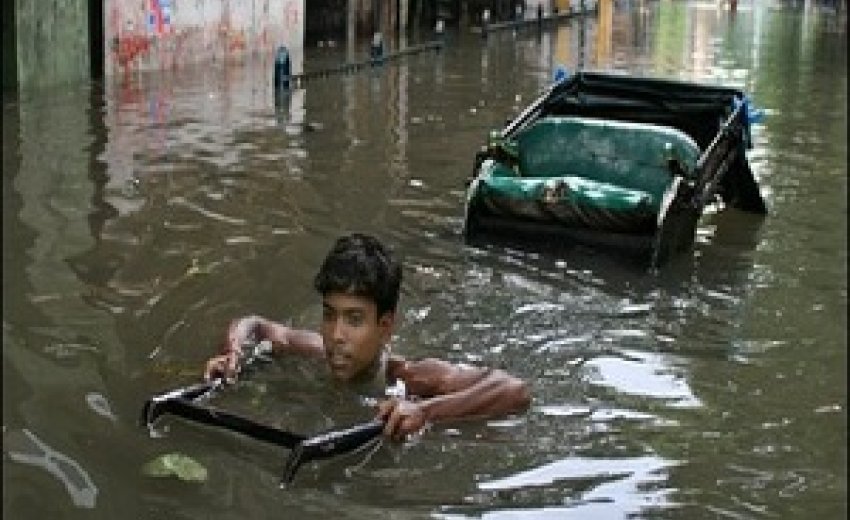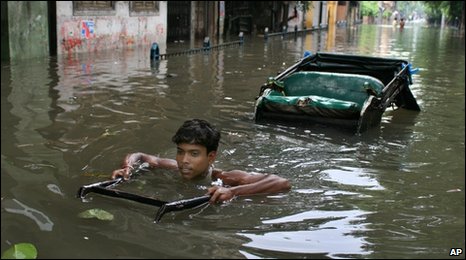 |
| Boy with a rickshaw in flooded Calcutta (July 2007) |
The climate change issue urgently demands a meeting of minds
Tackling climate change is one of the most pressing issues facing South Asia. Regional leaders are meeting in Bhutan this week, but are they any nearer agreeing to an action plan? The BBC's Navin Singh Khadka reports.
The issue of climate change is the main item on the agenda of the summit of the South Asian Association for Regional Cooperation (Saarc) summit under way in the Bhutanese capital Thimpu.
But given the poor track record of co-operation achieved by the regional grouping over other sensitive issues in the past, will the thorny issue of climate change become bogged down in rhetoric and recriminations?
Experts say the vulnerability of the region to climate change means that there is an urgent need for concrete action.
Words not action
"South Asian countries have started to face the effects of climate change and are particularly at risk," says the United Nations Environment Programme's (Unep) 2009 outlook.
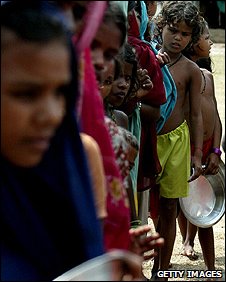 |
| Food aid queue, India (Getty Images) |
| The poor are worst affected by the effects of climate change |
"Intense floods, droughts and cyclones have impacted on the economic performances of South Asian countries and the lives of millions of poor, it also puts at risk infrastructure, agriculture, human health, water resources and the environment," it says.
This is not the first time that Saarc summit has discussed the issue.
The declaration of the 14th summit in Delhi in 2007, for instance, said leaders had agreed "to commission a team of regional experts to identify collective actions in sharing of knowledge on the consequences of climate change".
A year later, the 15th Saarc summit adopted the Dhaka Declaration on climate change.
But, experts say, hardly any of these words have been matched by actions.
In its climate change national action plan launched two years ago, India - the main regional player - stressed the need for co-operation.
"We will need to exchange information with South Asian countries and countries sharing the Himalayan ecology," the plan read.
"Co-operation with neighbouring countries will be sought to make a comprehensive network for observation and monitoring of the Himalayan environment, to assess fresh water resources and the health of the ecosystem."
There have been no serious follow-up since this bold pronouncement was made.
Drought
With regional co-operation confined to academic papers, key issues like regional flood forecasting are just not happening.
"Some countries in the region are not willing to share water-related data because they regard it as confidential," says Mats Eriksson, a senior hydrologist with the Kathmandu-based International Centre for Integrated Mountain Development which has spent years trying to bring together South Asian countries for flood forecasting at a regional level.
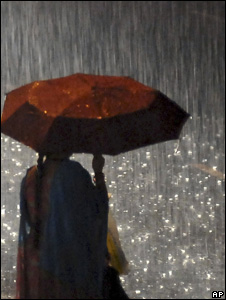 |
| Monsoon rain (Image: AP) |
| Climate models project more erratic rainfall patterns in the future |
But as millions of people in South Asia suffer from floods every monsoon, there is a worrying and growing uncertainty over the uneven distribution of monsoon rainfall in the region.
In recent years, some places have experienced heavy rainfall while others have seen far smaller amounts - and have even been hit by drought.
"Climate change could influence monsoon dynamics and cause lower summer precipitation, a delay to the start of the monsoon season and longer breaks between the rainy periods," a study by Purdue University in the US found recently.
While everyone now seems to be well informed as to the extent of the problem, questions remain over Saarc's response to it. But not everyone is pessimistic.
"This is the first time you have a Saarc summit where the leaders of countries in the region are getting together on a very specific subject and I am optimistic," said the chairman of the Inter-Governmental Panel on Climate Change, Rajendra Pachauri, who also heads the Energy Research Institute in Delhi.
Ainun Nishat, climate chief for the International Union for Conservation of Nature (IUCN) in Bangladesh, is also positive.
"I believe frequent contact between the leaders is essentially the first step that will lead to some concrete action because they always want to show progress."
But recent international climate negotiations, such as last year's Copenhagen summit, have shown that the countries in the region have different interests.
India's fast-growing economy, for instance, wants a global climate treaty that requires rich nations - and not rapidly developing countries - to cut carbon emissions.
It also wants global temperature rises to be limited to 2C from pre-industrial levels.
Bitter disputes
Whereas least developed countries in the region that are most vulnerable to climate change are lobbying for an international treaty irrespective of who has to reduce carbon emissions.
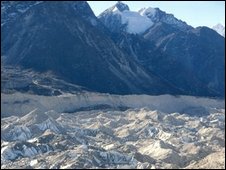 |
| Glacier in Nepal |
| Petty squabbles earlier hindered the climate change battle |
They want global warming to be limited to 1.5C from pre-industrial levels.
"I therefore do not expect Saarc countries to take common action in terms of dealing with climate change," says noted Indian environment activist Sunita Narain.
"I expect governments of the region to use Saarc as a meeting point in which they can put forward their respective actions against climate change."
But is that possible when major region players like India and Pakistan, for example, are engaged in bitter disputes?
One of the latest disputes between the South Asian nuclear rivals is that of sharing of water resources which, experts fear, will get worse as the climate change problem itself remains unaddressed.
